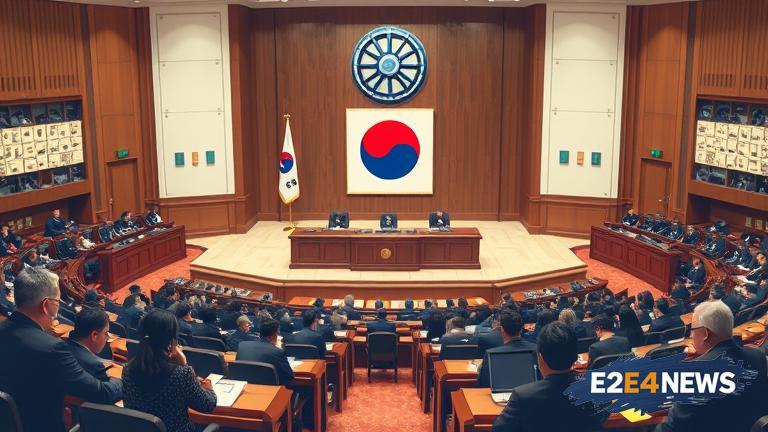The South Korean National Assembly is poised to vote on a highly contentious broadcasting bill, which has been met with fierce opposition from the main opposition party. The bill, which aims to revise the existing broadcasting laws, has been criticized for its potential to undermine media freedom and give the government excessive control over the media landscape. The main opposition party has been staging a filibuster, a parliamentary tactic where lawmakers prolong debates to delay or prevent a vote, in an attempt to block the bill’s passage. Despite the opposition’s efforts, the ruling party is expected to push through with the vote, sparking concerns over the potential consequences for the media industry and the country’s democratic institutions. The broadcasting bill has been a subject of controversy for months, with critics arguing that it would allow the government to exert undue influence over the media and stifle dissenting voices. The bill’s proponents, on the other hand, claim that it is necessary to regulate the media industry and ensure that broadcasters adhere to certain standards. The National Assembly’s vote on the bill is expected to be a close one, with the ruling party holding a slim majority. The opposition party has vowed to continue its filibuster, which has already lasted for several days, in an attempt to delay the vote and rally public support against the bill. The controversy surrounding the broadcasting bill has sparked a wider debate over media freedom and government control in South Korea. Many have expressed concerns that the bill would undermine the country’s democratic institutions and give the government too much power to shape public opinion. The international community has also been watching the developments in South Korea with interest, with some expressing concerns over the potential implications for media freedom and human rights. The South Korean government has defended the bill, arguing that it is necessary to ensure that the media industry is regulated and that broadcasters are held accountable for their actions. However, critics argue that the bill is overly broad and would give the government too much discretion to censor or punish broadcasters. The broadcasting bill has also sparked a heated debate over the role of the media in South Korean society. Some argue that the media should be free to report on any topic without fear of government reprisal, while others believe that the media should be subject to certain regulations to ensure that they do not spread false or misleading information. The National Assembly’s vote on the bill is expected to have significant implications for the media industry and the country’s democratic institutions. If the bill is passed, it could lead to a significant shift in the media landscape, with the government exerting more control over the industry. On the other hand, if the bill is defeated, it could be seen as a major victory for media freedom and the opposition party. The controversy surrounding the broadcasting bill has also highlighted the deep divisions within South Korean society. The country has a long history of democratic activism, and many have taken to the streets to protest against the bill. The opposition party has also been mobilizing public support, with many citizens expressing their opposition to the bill on social media and through other channels. As the National Assembly prepares to vote on the bill, the country is holding its breath, waiting to see what the outcome will be. The vote is expected to be a close one, and the consequences of the bill’s passage or defeat will be far-reaching. The international community will also be watching the developments in South Korea with interest, as the country’s democratic institutions and media freedom are put to the test. In conclusion, the South Korean National Assembly’s vote on the contentious broadcasting bill is a highly significant event that will have major implications for the media industry and the country’s democratic institutions. The bill’s passage or defeat will be a major test of the country’s commitment to media freedom and democratic values, and the outcome will be closely watched by the international community.





